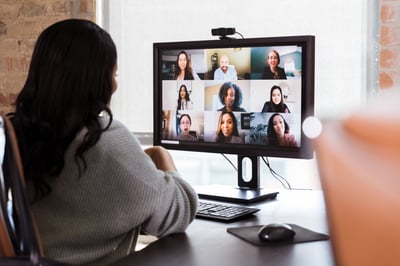July 7, 2022
 by Kristen McCabe / July 7, 2022
by Kristen McCabe / July 7, 2022

Oh, the excitement of events. The thrill that today holds something different.
You leave the office, get away from your computer, and go out into the real world. Events offer a world of possibilities of what you can learn and who you can meet.
Events are also full of inspiration – perhaps a speaker will spark an idea that catapults your career. You may meet a new mentor who will impact your life for years. You could start a conversation with a fellow marketer who's company complements yours and decide to host your event together.
A corporate event offers a certain level of excitement. There’s food, the chance to meet new people, and hopefully have a few laughs along the way! Even when it’s corporate, don’t forget that a business event is still just that: an event that will need its unique marketing type.
Event marketing is how companies organize, plan for, and execute an event when promoting a product, service, or brand.
So, if your company has an event marketing strategy, you have a presence at events. You could be participating in a trade show or something smaller, such as an open house at your office. Alternatively, you could host or sponsor a conference that goes for multiple days.
Event marketing holds immense potential for your overall marketing strategy, especially when using the right event marketing software. These tools can help your team get organized in planning and holding all types of events, but they streamline the entire process from start to finish.
There’s no denying that event marketing takes time and organizational skills. In addition, depending on the type of event, it can require a substantial budget.
Companies of all sizes utilize event marketing. It is also a marketing strategy for both B2B and B2C companies. It makes sense when you think about it – any company, by definition, has customers. Customers are all people: human beings to connect with at an event.
Companies engaging in B2B marketing often focus on educational events, such as panel discussions and conferences. In addition to the marketing department, sales representatives also often attend events. Sales teams use events as an opportunity to reach out to prospects or renew current customers. Their work pre-event goes into calling and emailing to set up meetings.
B2C companies often focus on events related to people’s hobbies and passions. Think of a wine company at a food festival or a sports drink company sponsoring a half marathon. The sports drink company might have a booth to give out free samples, knowing its target audience of athletic individuals is present.
It’s common for marketing teams to work with an agency or public relations firm when executing an event strategy.
of respondents believe in-person events can significantly impact achieving business goals.
Source: Bizzabo
There are many events to consider when executing an event marketing strategy. Here are the most common types.
A speaker presentation is one of the most common forms of B2B event marketing. Regarding your time and budget, you typically don’t have to invest as much when inviting a single speaker to present. If you’re just starting, ask a speaker who is a leader in their industry to give a presentation about a valuable topic to your customers and prospects.
If someone is an expert in their field and they have the knowledge your audience wants, you’ve got the basis for a speaker session! You could find the right person through coworkers, friends, family members, or even customers.
Every business professional knows the importance of networking. It can benefit your current job or your career as a whole. A networking session doesn’t require the educational element –- no speakers required! This means you only need a space and some catering on the event day! Remember, if you’re nervous meeting people, having a glass to hold and sip can make all the difference!
B2B marketers often use conferences. They require a lot of work and usually have a large budget, but more significant events also hold the opportunity for a bigger gain. People plan to attend conferences well in advance and are often calculated into a manager’s budget under education and training. Conferences feature several speakers, which means attendees have multiple leaders and potential topics they can learn from and about.
As you can imagine, the costs add up. All those speakers, their travel costs, the rooms to hold speakers and attendees, and the food to feed everyone. This is why conferences often come with a hefty price tag. Count on more than $1,000 a ticket (minimum!) for a three-day event with multiple speakers and sessions. Sponsors also help cover those costs.
Some conferences are held on a larger scale. Instead of just one room, attendees can choose from many rooms and speakers. Keynote sessions, often at the beginning or end of the day, will feature the most well-known speakers in the event space's largest room. A keynote speaker will share insights that are valuable to all conference attendees.
Instead of an entire conference, some businesses may choose to host a half-day event. This offers some of the same advantages of a conference, without the high cost. For example, a half-day event will still give attendees multiple speakers, providing a breadth of knowledge within a short period, without the high ticket price of a conference.
Instead of a speaker talking to attendees without any “hands-on” interaction, businesses may also offer workshops or classes.
A B2B marketing company could offer a class with free training on its product or service. Alternatively, it could bring in a guest speaker to teach on a topic its users all care about, such as marketing metrics and analyzing campaign success.
of attendees said live events gave them a better understanding of the product.
Source: WritersBlockLive
A VIP event is highly targeted at a company’s decision-makers. It’s all about providing an exclusive experience that makes people feel acknowledged and appreciated for their leadership.
Anything exclusive has an aspirational quality, making these high-level executives more likely to attend. It’s also an opportunity to interact with their peers, allowing them to “rub shoulders” with other elite professionals.
If you offer an educational element, those at the vice president and CMO level want to know it will live up to their knowledge level.
For this type of event marketing to be successful, it must live up to that “VIP” feel. What makes this event so unique? What will attendees get out of this event that they can’t find anywhere else? You need to give these leaders something different, something they can’t go out and do themselves on any given day.
Sponsorships can be a form of event marketing, but not all sponsorship is event marketing. In the most simple terms, think of it like this: sponsorship is usually a form of event marketing if the brand has more than its logo at the event.
If there are any of these elements, it’s event marketing:
That last one is important if you are a B2B marketer. The whole point of sponsoring that event is to get sales. Without contact details, you cannot nurture relationships. This is why many people give away swag or free items at events.
Many events, especially conferences, feature a specific “sponsor hall” or “expo hall.” The difference in a trade show? Those sponsor booths are the event!
There are still workshops and classes, but the “main event” is meeting with sellers in a specific industry. The value for attendees comes from meeting with vendors. One of the reasons companies use trade shows is to show off their newest products and features. You can bet competitors are trying to get a sneaky peek at their competition, too.
Trade shows are often used interchangeably with the word “expo,” which means a large exhibition. The term “exposition” usually makes me think of an “exhibition hall,” where trade shows are held. Expos are often open to consumers and are either free or have a low ticket price. They don’t require a trade show's significant entry fee, and the audience isn’t as specific.
Awards and competitions are a great way to get people talking. Winners love sharing their successes with others and on social media!
Aside from nominees and winners spreading the word, awards are an excellent opportunity for press coverage. Invite the media, and you’ll help them do their job by giving them something to write about.
This type of event is utilized by both B2B and B2C companies. Presenting them establishes the hosting company as an industry leader, helping build brand reputation and sell their products or services.
B2B awards focus on allowing their customers to shine. However, where there are winners, there are losers, so be sure to make scoring criteria transparent. When people don’t win, they need to understand why. Scoring criteria helps minimize any hard feelings. The point is to get more customers – not lose them!
Award ceremonies can be pricey. They are by nature meant to be prestigious, and you need a venue that gives that feel. In addition to the venue, other aspects are expected at an awards ceremony, such as catering. You’ll have additional costs, like centerpieces, printed menus, and wait staff if it is a sit-down meal. And then there are the awards themselves – they should be something people want to display with pride.
An awards gala often includes dancing, a DJ or band, and a host. Not every awards ceremony needs to go to this level, but remember every potential cost before you commit to an awards ceremony. As a side note, you can give awards without a ceremony; it’s still a part of your marketing strategy, but it’s not event marketing.
Some awards happen with live-action competitions rather than a written submission. Winners are decided right then and there, rather than by a group of judges before the awards. B2C companies may do this by hosting industry-specific competitions for those who use their products.
Festivals and parties create a fun experience for your customers and target market. A B2B event may have a more focused audience – you would specifically invite partners, customers, and valuable prospects. B2C events such as festivals will often reach out to a much bigger audience to grow brand awareness. This is especially true if there is a cost for entry. Festivals, for example, are open to anyone and everyone who wants to attend!
A festival could be a small event for the local community or a large-scale event by big brands. Parties are held for several reasons – what have you done that you want to celebrate? Examples include celebrating an anniversary of how long your company has been in business, opening a new office location, or launching a new product.
In addition to celebrating your company’s success with a party, you can invite customers, potential customers, and partners. It raises awareness of your company and allows customers to share in your success.
These tactics apply to big and small events, ensuring you will find event promotion strategies that suit your event size, budget, and audience.
If you hear of an event that you want to attend, what’s the first thing you do? Chances are you Google it for more information. Ensuring your website has all the necessary event details is imperative to your success.
Your event landing page serves two purposes:
Ensuring you fulfill those two goals requires a variety of information on your website. In total, the nine elements to include on your landing page are:
A strong registration call-to-action CTA is a big part of your event website. Whenever it is possible, always include a registration button.
If you find yourself in a situation where you don’t have all of the details for registration just yet, make it clear with a Save-the-Date. For example, you may have confirmed your event date and speaker, but some details (such as time and location) are still being finalized. Your event is a month away, and you need to raise awareness before it’s too late.
Providing the ability to register is ideal, but at least with this option, it’s clear that registrations are not yet open. That way, you’re not leaving your audience frustrated as they search for a way to register. Be sure to take advantage of event registration and ticketing software to help facilitate attendee registration and make it easy for event planners to track and manage guest lists.
The best part of using social media to share your event? It’s FREE! Although you can pay for advertising on social network platforms, which I’ll talk about in the next promotional tactic, you can get results without spending a dime.
The four major social media platforms you can use to promote your event are Twitter, LinkedIn, Facebook, and Instagram. Your event's target audience will significantly impact which platform you focus your time and energy on
LinkedIn and Twitter are often the better options if you are running your event for business professionals. On the other hand, if you are promoting an event for consumers, such as food, clothing, or massages, Facebook and Instagram are usually more effective.
In addition to sharing the event on your company’s social media profiles, some employees are also willing to share business-related posts on their LinkedIn or Twitter profiles. Find relevant hashtags related to your event and keep your networks updated with any event news. You want to continue building excitement in the months and weeks leading up to your event.
There are many marketing channels on which you can pay to promote your event, including digital and print.
If you are hosting a B2C event, consider using newspapers. A local publication could provide you with both print and digital options. Similarly, if you are running a B2B event, you could advertise in an industry trade magazine that will also have both print and digital options.
In digital advertising, look into opportunities for display ads through PPC services. Display ads include square boxes or banners that you’ll see on the side next to the content. You’ll get exposure on another company’s site, and visitors to that website can click through to your event.
Sometimes when you see display ads, they are a form of retargeting – after an individual visits your event website, your event display ad will appear while they are on other websites.
Email marketing is one of the most effective ways to get the event registrations rolling in. You have a database of contacts, so be sure to use it!
It’s essential to target your emails. If the event is only relevant to some people on your email list, send it only to those contacts – not your entire database! Unless your event is an all-day affair worth the price of a plane ticket, there’s no point emailing San Francisco contacts when your event is in Boston.
If time allows, take those who have already registered off the recipient list for the “register now!” emails you send.
Some other email marketing best practices to keep in mind:
One of my favorite phrases in marketing is “mutually beneficial relationships.” It’s about finding opportunities to benefit you and another company or individual.
You are doubling your audience when you have a mutually beneficial relationship. Not only can you reach out to your customers and prospects, but you now have another business's email database and social media followers.
Partners who can benefit from promoting your event include your speakers and sponsors. Contact them and ask if they will share the event with their audiences via social media and email. There is a good chance your speakers will be influencers in their field, which means they will have email subscribers and a strong following on social media.
To do influencer marketing right, take advantage of influencer marketing platforms that can help discover social influencers, manage influencer-generated content, and analyze influencer marketing campaigns.
If you have a blog, writing content around your events serves your event and content marketing goals.
Here are three types of blog posts you can easily share with your readers:
Blog posts are an effective way to share your event with guests who might not be on your email list or following you on social media.
Events are essential to give your company a face and a voice and personalize it for your target audience. You can be at a conference or speaking about your product at a trade show; whatever it is, you need to fully optimize your attendance and develop a marketing strategy to maximize your return on investment for your event.
These are useful strategies for marketing your next event to reach its full potential.
When done correctly, event marketing can offer a business many benefits. Here are some to keep in mind as you go about planning your next event.
Since marketing aims to sell a product or service, it makes sense that events help do just that! Whether your company is B2B or B2C, being there in person allows you to establish human relationships.
This impacts conversion rates (the number of sales), especially since customers can ask you their questions right then and there. Ensuring you staff events with knowledgeable employees gives you the best chance of closing more deals.
Measuring the sales at your event is an easy way to track the ROI of your event marketing efforts directly.
Even if a prospect doesn’t immediately convert at an event, there is the opportunity to add them to your database. They will become a lead, who you can nurture through the sales process. This is especially true for B2B marketers.
There are many ways you may get someone’s email address. You could be sponsoring an event, and someone visits your trade-show booth or enters a competition you are running. If you are hosting the event, you will get people’s email addresses when they register.
You can use those email addresses to build relationships that will lead to future sales, whether your company is B2B or B2C. Just be sure you follow any regulations when you collect people’s data. Regulations may require the attendee’s consent before adding them to your email list.
Tracking the number of leads and new contacts in your database is another number that is easy to measure with event marketing. Go into your event with a specific goal of how many leads or new contacts you hope to attract at the event.
Events are a great way to get customers and prospects to discover you. By hosting an activity, you’re giving people the opportunity to interact with your brand. A B2B company may also increase brand awareness by organizing a conference with influential speakers. These “influencers” tell their social media followers about speaking engagements and, as a result, your brand! In addition, these individuals often bring in media coverage.
Events can also grow awareness through attendees’ social media profiles. For instance, if a guest posts a picture of your event to their Twitter profile, mentions your company, and tags you, then your brand has now been exposed to an entirely new audience: their network. If 20, 50, or more attendees post about your event, it’s easy to see how the exposure grows!
Measuring the press coverage surrounding your event is a great way to quantify your event’s success. Don’t forget to look at social media interaction as well - how many times was your event or brand mentioned? Did you have an event hashtag, and how often was it used? Look for anything you can find to measure, and then do so!
People will remember if you host an event that exceeds attendee expectations. Creating an experience that people remember will also make them remember your brand. Brand affinity can also increase when companies sponsor events for charities. People can associate the brand with a cause they care about.
When a company cares about the same thing you do, it’s a lot easier to care about a company. Especially if you are in an industry where your competitors have similar products and pricing and have a market presence. Events can provide a human element that consumers find relatable.
Brand affinity relates to loyalty – we are likelier to remain customers with brands we like and trust! While brand affinity can be hard to measure with your specific events, plenty of studies have shown its benefits.
Given the fact that effective event marketing relies heavily on face-to-face communication, it makes sense that this is where relationships are built.
Events are the place to build those relations, tell your stories, and create that magic. Relationship building is beneficial for B2B marketers supporting a sales team. An interpersonal connection can be the first step for renewals and new customers. After all, aren’t you more likely to take a call from someone you have met in person and enjoyed speaking with?
Some events are exclusive to a company’s decision-makers at a significant prospect company. Alternatively, invitees could be current customers to whom you want to show appreciation or renew their contracts. Holding an event for your top clients shows that you both recognize and value their business. And happy customers mean returning customers, which will increase retention rates.
By hosting an educational event, you establish that you know not only what you are doing but also so much you can teach others.
Any time you offer a class, or other career development, you show you have something to teach others. Many events will feature a speaker you have contracted rather than an executive at your company. In this case, you are still displaying your thought leadership.
The person speaking is an influencer leading industry news and trends. Aligning yourself shows that you are also a leader – you know what's happening in your industry and want to share that value with customers and prospects. Working with an influencer is a positive reflection on you and your brand. After all, your business was smart enough to get that speaker!
Events can be a fun way to grow your marketing strategy. They require substantial work, but the benefits are worth it! There is plenty to consider when executing your event and many types of events to choose from for B2B and B2C marketers, and businesses of every size.
Because every event needs a relevant and catchy hashtag, don't forget about hashtag monitoring software to gather analytical insights.
Kristen’s is a former senior content marketing specialist at G2. Her global marketing experience extends from Australia to Chicago, with expertise in B2B and B2C industries. Specializing in content, conversions, and events, Kristen spends her time outside of work time acting, learning nature photography, and joining in the #instadog fun with her Pug/Jack Russell, Bella. (she/her/hers)
Do you drown in invoice receipts while forecasting expenses for an event?
 by Isabella Sevilla
by Isabella Sevilla
In order to retain support, organizations and businesses need to get creative in engaging...
 by Asaf Darash
by Asaf Darash
Business-to-business (B2B) companies are usually in agreement that events generate more leads...
 by Aimee Laurence
by Aimee Laurence
Do you drown in invoice receipts while forecasting expenses for an event?
 by Isabella Sevilla
by Isabella Sevilla
In order to retain support, organizations and businesses need to get creative in engaging...
 by Asaf Darash
by Asaf Darash


